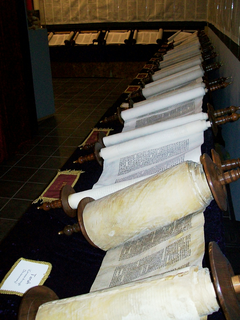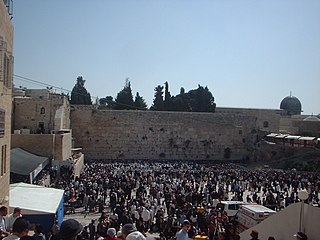Related Research Articles

Christianity is rooted in Second Temple Judaism, but the two religions diverged in the first centuries of the Christian Era. Christianity emphasizes correct belief, focusing on the New Covenant as mediated through Jesus Christ, as recorded in the New Testament. Judaism places emphasis on correct conduct, focusing on the Mosaic covenant, as recorded in the Torah and Talmud.

Judaism is an Abrahamic, monotheistic, and ethnic religion comprising the collective religious, cultural, and legal tradition and civilization of the Jewish people. It has its roots as an organized religion in the Middle East during the Bronze Age. Some scholars argue that modern Judaism evolved from Yahwism, the religion of ancient Israel and Judah, by the late 6th century BCE, and is thus considered to be one of the oldest monotheistic religions. Judaism is considered by religious Jews to be the expression of the covenant that God established with the Israelites, their ancestors. It encompasses a wide body of texts, practices, theological positions, and forms of organization.

Jewish prayer is the prayer recitation that forms part of the observance of Rabbinic Judaism. These prayers, often with instructions and commentary, are found in the Siddur, the traditional Jewish prayer book.

A siddur is a Jewish prayer book containing a set order of daily prayers. The word siddur comes from the Hebrew root ס־ד־ר, meaning 'order.'

The Hebrew Bible or Tanakh, also known in Hebrew as Mikra, is the canonical collection of Hebrew scriptures, including the Torah, the Nevi'im, and the Ketuvim. These texts are almost exclusively in Biblical Hebrew, with a few passages in Biblical Aramaic.
The Pharisees were a Jewish social movement and a school of thought in the Levant during the time of Second Temple Judaism. After the destruction of the Second Temple in 70 CE, Pharisaic beliefs became the foundational, liturgical, and ritualistic basis for Rabbinic Judaism.
Messianic Judaism is a modern, syncretic Christian religious movement that incorporates some elements of Judaism and Jewish tradition with evangelical Christianity.
Aleinu or Aleinu leshabei'ach, meaning "it is upon us" or "it is our obligation or duty" to "praise God," is a Jewish prayer found in the siddur, the classical Jewish prayerbook. It is recited in most communities at the end of each of the three daily Jewish services and in the middle of the Rosh Hashanah mussaf. It is also recited following Kiddush levana and after a circumcision is performed. It is second only to the Kaddish as the most frequently recited prayer in current synagogue liturgy.

The Amidah, also called the Shemoneh Esreh, is the central prayer of the Jewish liturgy. Observant Jews recite the Amidah at each of three daily prayer services in a typical weekday: morning (Shacharit), afternoon (Mincha), and evening (Ma'ariv). On Shabbat, Rosh Chodesh, and Jewish festivals, a fourth Amidah (Mussaf) is recited after the morning Torah reading, and once per year a fifth Amidah (Ne'ilah) is recited, at sunset on Yom Kippur. Due to its importance, in rabbinic literature it is simply called hatefila. According to legend, the prayer was composed by the Rabbis of the Anshei Knesset HaGedolah. Accordingly, in Judaism, to recite the Amidah is a mitzvah de-rabbanan.

Shlomo Riskin is an Orthodox rabbi, and the founding rabbi of Lincoln Square Synagogue on the Upper West Side of New York City, which he led for 20 years; founding chief rabbi of the Israeli settlement of Efrat in the Israeli-occupied West Bank; dean of Manhattan Day School in New York City; and founder and Chancellor of the Ohr Torah Stone Institutions, a network of high schools, colleges, and graduate Programs in the United States and Israel. He belongs to the Open Orthodox stream of Judaism.

Rabbinic Judaism, also called Rabbinism, Rabbinicism, or Judaism espoused by the Rabbanites, has been the mainstream form of Judaism since the 6th century CE, after the codification of the Babylonian Talmud. Rabbinic Judaism has its roots in Pharisaic Judaism and is based on the belief that Moses at Mount Sinai received both the Written Torah and the Oral Torah from God. The Oral Torah, transmitted orally, explains the Written Torah. At first, it was forbidden to write down the Oral Torah because the rabbis feared that it would become rigid and lose its flexibility, but after the destruction of the Second Temple they decided to write it down in the Talmud and other rabbinic texts.
Jewish liturgy is the customary public worship of Judaism. The liturgy may include responsive reading, songs, or music, as found in the Torah and Haftorah, the Amidah, piyyutim, and Psalms. Singing or reading the Psalms has a special role in the Jewish liturgy, in particular they are used in the daily Jewish prayer services of Shacharit, Mincha, and Arvit.
Ein Keloheinu is a well known Jewish hymn. Orthodox Jews pronounce it as Ein Kelokeinu when referring to it outside of prayer, in order to avoid taking the name of God in vain or otherwise violating the sanctity of reverence to the Almighty.
Mussaf is an additional service that is recited on Shabbat, Yom Tov, Chol Hamoed, and Rosh Chodesh. The service, which is traditionally combined with the Shacharit in synagogues, is considered to be additional to the regular services of Shacharit, Mincha, and Maariv. In contemporary Hebrew, the word may also signify a newspaper supplement.

The Priestly Blessing or priestly benediction,, also known in rabbinic literature as raising of the hands or rising to the platform or dukhanen or duchanning, is a Hebrew prayer recited by Kohanim. The text of the blessing is found in Numbers 6:23–27.

Berakhot is the first tractate of Seder Zeraim of the Mishnah and of the Talmud. The tractate discusses the rules of prayers, particularly the Shema and the Amidah, and blessings for various circumstances.
Siddur Sim Shalom refers to any siddur in a family of siddurim, Jewish prayerbooks, and related commentaries, published by the Rabbinical Assembly and the United Synagogue of Conservative Judaism.
Temple Beth Israel was a Reform synagogue located at 840 Highland Road in Sharon, Pennsylvania. Originally called House of Israel Congregation, it was founded in 1888 as an Orthodox congregation by Jews from Eastern Europe.
The Birkat haMinim is a curse on heretics which forms part of the Jewish rabbinical liturgy. It is the twelfth in the series of eighteen benedictions that constitute the core of prayer service in the statutory daily 'standing prayer' of religious Jews.
Pirqoi ben Baboi, also written Pirqoi ben Babui, was a Babylonian scholar of the Talmud who lived sometime in the 8th–9th century. He is chiefly remembered for a polemical letter he wrote, addressed to all places in Afriqiya and Sfarad, but thought to be directed in particular to the Qeirwān Jewish community in Tunisia concerning the traditions of Eretz Israel. His writings have been called 'one of the most intriguing Babylonian Jewish texts to have survived the vicissitudes of history'.
References
- ↑ Ruth Langer – Theology Department – Boston College
- ↑ "AJS 2014 Presidential Address".
- ↑ The Search for the Origins of Christian Worship: Sources and Methods for the Study of Early Liturgy, by Paul F. Bradshaw, 2002 , p. 42
- ↑ Out of the Shtetl: Making Jews Modern in the Polish Borderlands, by Nancy Sinkoff, p. 241
- ↑ “From Study of Scripture to a Reenactment of Sinai: The Emergence of the Synagogue Torah Service,” reprinted in the Journal of Synagogue Music 31:1 (Fall 2006): 104-125
- ↑ Resplendent Synagogue: Architecture and Worship in an Eighteenth-Century Polish Community, by Thomas C. Hubka , 2003, University Press of New England, p. 193
- ↑ “Jews debate anti-gentile prayers with Respect to Good Friday Prayer,” By MENACHEM WECKER, March 21, 2008, National Catholic Reporter, http://uvcarmel.wordpress.com/2008/03/20/jews-debate-anti-gentile-prayers/